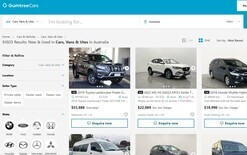Dealer calls for CCS relief

A veteran dealer fears being left thousands of dollars out of pocket once the clean car standard (CCS) is introduced because he specialises in disability vehicles, which currently will not be exempt from the scheme’s penalties.
Rod Milner, managing director of Milner Mobility in Auckland, says new and used mobility vehicles for disabled people have previously been spared from most of the fees incurred through government legislation, including the clean car discount.
However, he is concerned this is not the case with the CCS and he is calling on politicians and industry members to help get the decision changed.
Milner, pictured with his son and general manager Darren Milner, warns if that doesn’t happen then many of his customers will be forced into buying older vehicles with higher emissions, which is the opposite goal of the clean car policies.
He says his business will also be unable to pass on the CCS penalties for units that have already been ordered but won’t arrive in the country until after the legislation is rolled out on January 1, because consumers have already signed contracts for those vehicles.
It also has vehicles in stock that are unable to complied without a signed-up customer due to other exemption requirements. Milner says because the CCS is applied at compliance time, rather than border check, these units will all incur a debit.
“Every time new regulations have come along disabled vehicles have always had an exemption, and that is gratefully received because having those doesn’t make us as a business any richer but it does help the people who need those vehicles,” explains Milner.
“We do not deal in big volumes , but the penalties will soon start adding up when 100 per cent of our vehicles are specialised mobility vehicles and 95 per cent will attract penalties under the clean car standard.
“The vehicles simply don’t exist at a reasonable price for us to be able to purchase. Battery size is limiting the development on specialised vehicles.
“The margins are very small and I’m going to have to find a way to absorb that tax myself but it’s going to be difficult.”
Milner adds that because his Auckland business specialises in vehicles for disabled people, it can’t import cars that will attract credits under the CCS and therefore offset any penalties accrued.
He notes one of the few suitable late-model hybrid vehicles available for his customers, the Nissan Serena, costs about $75,000 each and is unaffordable for most disabled people.
“A lot of disabled people get grants from Lotteries and ACC but most Lottery grants are limited to $40,000 so it makes it very limited in what we can supply,” says Milner.
“A Toyota Hiace will attract a substantial penalty under the standard and we can’t suddenly charge that to the customer because a lot of our contracts are already written.
“We weren’t told what the penalty amounts would be by the government until November. We have a three-to-five-month waiting list before delivery after purchase, so we can’t go back and ask those people for more, mainly because they won’t have the money in most cases anyway.”
Seeking change
Milner has written about the issue to Michael Wood, Minister of Transport, Poto Williams, Minister for Disability Issues, and politicians from across the National, Act and Green parties.
He has also been in touch with the Imported Motor Vehicle Industry Association (VIA), which he says is looking into the matter, and had correspondence with the Ministry of Transport (MoT).
“We will keep putting our case and hope we can secure some change,” he adds. “This is the first exemption we’ve never been able to get and is the government that short of money that they’re trying to get cash from every Tom, Dick and Harry?
“We were interested to note that specialist vehicles 20 years and older are exempt as are motorsport and military vehicles. We just want to be treated the same, as a specialised importer.
“We’ve been asking the ministers about this for months. Just please give us the exemption from the tax because it will make a huge difference to disabled people and we need it before the end of December.
“Our focus on second-hand imports reflects the reality that the cost of new mobility vehicles is prohibitive for most of our clients in New Zealand. It is not an overstatement to say that, without the inward flow of our second-hand mobility vehicle imports, many disabled New Zealanders would have no means of private transportation.”
He says if the government sticks with the current approach it means dealers will have to put people into older vehicles in order to find ones at a price they can afford.
Milner Mobility usually buys models up to about 2018 or 2019 for those who have secured Lotto grants, but if the overall costs of those vehicles increase because of the CCS it will have to look purchasing older ones instead.
“We may have to bring in those built in 2010 or 2012. These people will be going into older vehicles, which isn’t what the government wants.
“The emissions under the CCS are also a moving target so if we don’t get an exemption from the penalties then it’s only going to get harder for us year on year.”
Milner also predicts the new scheme risks putting a lot of people out of business across the automotive industry. He fears the regulations, while targeted at importers, are trying to push consumers into a specific market rather than letting them evolve into it.
“I have been in the motor trade 60 years and this is the one of the worst policies I have seen from a government – this isn’t going to help anyone at all.”
He claims the dispensation for specialised disability vehicles to avoid fees under the clean car discount only applies until June next year “and then we’ll have to fight for that all over again”. Milner says it should be a permanent exemption.
Ministry response
The MoT says the CCS is one of a range of government initiatives to tackle transport sector carbon dioxide (CO2) emissions levels as part of an effort to address climate change.
“The clean car standard is a government target that regulates importers to reduce CO2 emissions to specific targets by encouraging a greater supply of low and no-emission vehicle imports to New Zealand,” they told Autofile Online.
“The clean car standard charges and credits are charged to the vehicle importer. The importer can make the decision to import low-emissions vehicles to offset the charge for any high-emissions vehicles they import, or they can pay the charge.”
They note the fees and credits come into effect from January 1 but will not need to be paid until June 1, to give importers “time to import more low-emissions vehicles that receive a credit to off-set any high-emissions vehicles they have imported”.
The spokesperson adds the new regulations also allow for credits to be traded between importers, so importers of high-emitting vehicles can work with importers of low-emitting vehicles to offset their charges.
However, disability vehicles will remain excluded from paying charges on high-emission vehicles under the discount scheme, according to the MoT, because it is set in regulation and does not expire.
“Disability vehicles remain eligible for rebates if they are low and zero-emission. This is to support the uptake of hybrid and electric options,” the spokesperson says.





